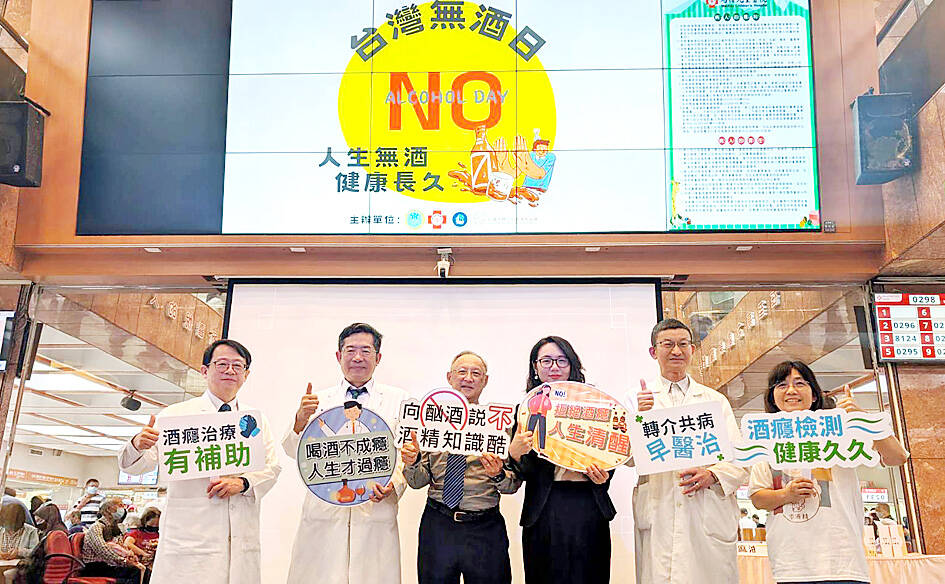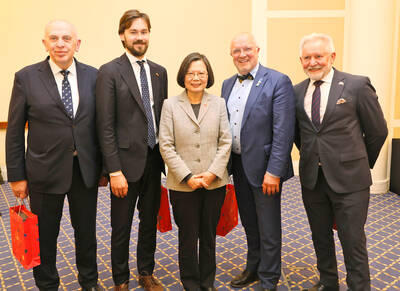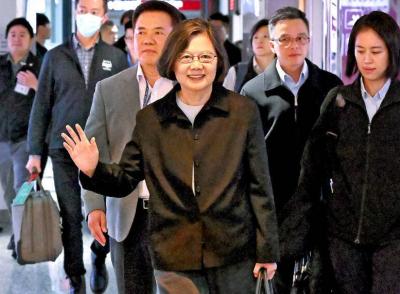Drinking alcohol increases a person’s risk of developing at least seven types of cancer, and nearly half of Taiwan’s population is alcohol intolerant, meaning they are at greater risk of developing cancer from imbibing, the Ministry of Health and Welfare and an advocacy group said yesterday ahead of Taiwan No Alcohol Day on Thursday.
The Taiwan Alcohol Intolerance Education Society (TAIES) in 2019 launched Taiwan No Alcohol Day to raise public awareness about the dangers of drinking alcohol. The group chose May 9 as a play on the words “five” (五) for May and “no” (無), both pronounced as wu in Chinese, and “nine” (九) and “alcohol” (酒), both pronounced as jiou.
At a news conference at Mackay Memorial Hospital in Taipei, the ministry, the hospital and TAIES announced the start of No Alcohol week and that they would be holding a series of health lectures at Mackay Medical College in New Taipei City and popular tourist sites in northern Taiwan.

Photo: CNA
The Department of Mental Health cited the International Agency for Research on Cancer as saying that alcohol consumption is causally linked to seven types of cancer: mouth, throat, larynx, esophagus, liver, breast and colon.
Studies have also suggested that the prevalence of aldehyde-dehydrogenase 2 (ALDH2) deficiency — a lack of a major enzyme responsible for alcohol oxidation — is as high as 49 percent in Taiwan, the department said.
People with the deficiency cannot metabolize alcohol normally, and might be at higher risk of developing cancer, it said.
TAIES chairperson Chen Che-hong (陳哲宏) said that many people have the misconception that if their face turns red and becomes hot while drinking alcohol, it means the alcohol is being metabolized and that they can consume more because their liver is functioning properly, but that “alcohol flush reaction” is predominantly due to ALDH2 deficiency.
People with the deficiency lack the enzyme for degrading acetaldehyde, a carcinogen, to nontoxic acetic acid, he said, adding that nearly 8 percent of the global population has ALDH2 deficiency, but the prevalence is much higher in East Asia.
Therefore, the health risk from alcohol consumption is higher in Taiwan and East Asian countries, even if people there drink less, he added.
Aside from and increased risk of cancer, people with alcohol dependence are 3.6 times more likely to develop a major depressive disorder, and are associated with a suicide risk six to 10 times greater than that of the general population, department Director Chen Liang-yu (陳亮妤) said.
To help people with alcoholism, the ministry last year established the Taiwan Alcohol Abstinence and Addiction Prevention Center at Mackay Medical College, she said, adding that the ministry encourages people with alcohol dependency to seek a professional consultation for treatment.
The center has helped more than 400 people in the past six months and referred 82 for alcohol addiction treatment, and the government provides a subsidy of up to NT$40,000 per person per year for the treatment, the ministry said.

Former president Tsai Ing-wen (蔡英文) on Monday called for greater cooperation between Taiwan, Lithuania and the EU to counter threats to information security, including attacks on undersea cables and other critical infrastructure. In a speech at Vilnius University in the Lithuanian capital, Tsai highlighted recent incidents in which vital undersea cables — essential for cross-border data transmission — were severed in the Taiwan Strait and the Baltic Sea over the past year. Taiwanese authorities suspect Chinese sabotage in the incidents near Taiwan’s waters, while EU leaders have said Russia is the likely culprit behind similar breaches in the Baltic. “Taiwan and our European

The Taipei District Court sentenced babysitters Liu Tsai-hsuan (劉彩萱) and Liu Jou-lin (劉若琳) to life and 18 years in prison respectively today for causing the death of a one-year-old boy in December 2023. The Taipei District Prosecutors’ Office said that Liu Tsai-hsuan was entrusted with the care of a one-year-old boy, nicknamed Kai Kai (剴剴), in August 2023 by the Child Welfare League Foundation. From Sept. 1 to Dec. 23 that year, she and her sister Liu Jou-lin allegedly committed acts of abuse against the boy, who was rushed to the hospital with severe injuries on Dec. 24, 2023, but did not

LIKE-MINDED COUNTRIES: Despite the threats from outside, Taiwan and Lithuania thrived and developed their economies, former president Tsai Ing-wen said Former president Tsai Ing-wen (蔡英文) on Saturday thanked Lithuania for its support of Taiwan, saying that both countries are united as partners in defending democracy. Speaking at a reception organized by the Lithuania-Taiwan Parliamentary Friendship Group welcoming her on her first visit to the Baltic state, Tsai said that while she was president from 2016 to last year, many Lithuanian “friends” visited Taiwan. “And I told myself I have to be here. I am very happy that I am here, a wonderful country and wonderful people,” Tsai said. Taiwan and Lithuania are in similar situations as both are neighbors to authoritarian countries, she

Former president Tsai Ing-wen (蔡英文) is to visit the UK during her ongoing European trip, which originally included only Lithuania and Denmark, her office said today. Tsai departed Taiwan for Europe on Friday night, with planned stops in Lithuania and Denmark, marking her second visit to the continent since her two-term presidency ended in May last year. Her office issued a statement today saying that Tsai would also visit the UK "for a few days," during which she is to meet with UK politicians and Taiwanese professionals, and visit academic and research institutions. Following Tsai's stop in Denmark, she is to visit the